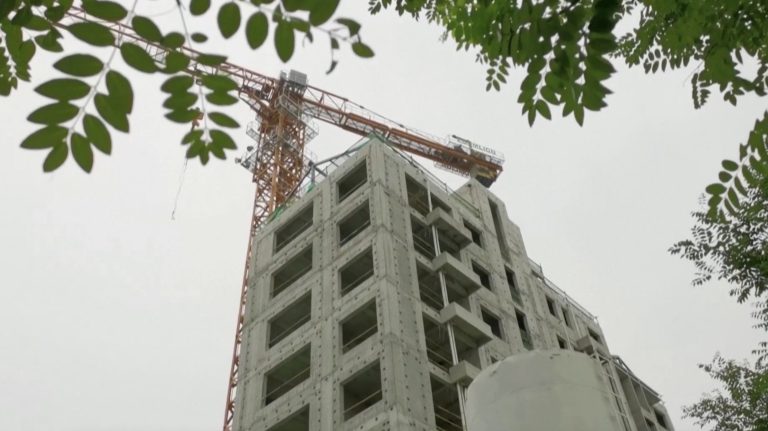Stock prices for a number of Chinese developers plummeted at the opening of trading on Monday, deepening an already dire situation for China’s economy.
According to Bloomberg, developer shares fell 7.1 percent on Monday morning (Sept. 25), bringing share prices to their lowest point in nine months.
Shares for China’s second largest developer and primary catalyst for the crisis, Evergrande, dropped 22 percent, after it abruptly canceled creditor meetings saying that they “must revisit its restructuring plan,” Bloomberg reported.
However the embattled developer was not the major loser.
China’s Aoyuan Group Ltd saw its share price drop a staggering 72 percent after its shares started trading again following an 18-month halt.
Success
You are now signed up for our newsletter
Success
Check your email to complete sign up
The decline wiped out around $56 billion from the combined valuations of all traded real estate companies in China.
This is but the latest in a string of bad news for the Chinese real estate sector, which saw China’s securities regulators recently launch an inquiry into Ping An Real Estate Co. concerning an overdue loan payment and China’s Oceanwide Holdings Ltd. said on Monday that a Bermuda court issued the company a “winding-up order.”
A winding-up order is a process of liquidating assets of a business that can no longer pay its bills.
Also, in August, Evergrande’s Hengda Real Estate Group became a target of a probe after the company reportedly missed a deadline for releasing its annual results, which prompted the rebuke of two major stock exchanges.
CHINA’S REAL ESTATE CRISIS:
- Another Chinese Real Estate Developer Files for Bankruptcy Protection in US Court
- Evergrande’s Hengda Real Estate Group Under Probe for Allegedly Breaking Information Rules
- Police Detain Evergrande Wealth Management Staff in Latest Blow to Embattled Property Developer
Key season approaching
China’s real estate sector is on edge as it enters what is historically a busy period for home purchases in the country, Golden Week.
Real estate activity over Golden Week — which starts this Friday (Sept. 29) and runs into October — will shed light on whether or not China’s real estate industry can start to recover from a now years long slump.
However, in recent years, Golden Week activity has not borne the fruit the industry needs.
In 2021, despite a variety of discounts, lottery promotions, favorable loan terms and other measures the market did not react and registered the lowest number of property turnovers in many years, China’s Global Times reported at the time.
A similar scenario unfolded in 2022.
The prolonged slump is being blamed on Chinese Communist Party policy, or the “three red lines,” which aim to avoid excessive financing and tighten property purchasing policies in a bid to guarantee the stable and sound development of the real estate industry.
Specifically, the three red lines dictate that a developer’s liabilities should not exceed 70 percent of assets, new debt should not be greater than 100 percent equity and money reserves must be at least 100 percent of short term debt.
READ MORE:
- US Officials Highlight Depth of China’s Economic Crisis
- From Evergrande to Country Garden: How China’s Property Titans Mirror Broader Economic Woes
- China Plans 1.5 Trillion in Financing to Prop Up Debt-Swamped Local Governments
China’s housing oversupply
At an economic forum on Sept. 23, a former top Chinese official said that China has so many excess homes that by some estimates the country could house upwards of three billion people, Business Insider reported.
That would be nearly ten times the American population or 15 times the population of Western Europe.
At the forum, the former deputy head of the National Bureau of Statistics, He Keng, said, “How many vacant homes are there now? The experts are presenting figures that vary greatly. The most extreme believe the number of vacant homes are now enough for three billion people. We only have 1.4 billion people,” adding that, “That estimate might be a bit much.”
Reuters recently reported that Chinese government statistics from August indicate that the area of all unsold homes in the country is approximately 7 billion square feet.
These numbers do not include sold but unfinished homes, known as “rotten-tail buildings,” which by some estimates number in the thousands.
Essentially, China’s real estate sector is sitting on countless vacant properties with no buyers and, even existing home sales continue to fall short, indicating that the country’s real estate sector is far from recovering.














